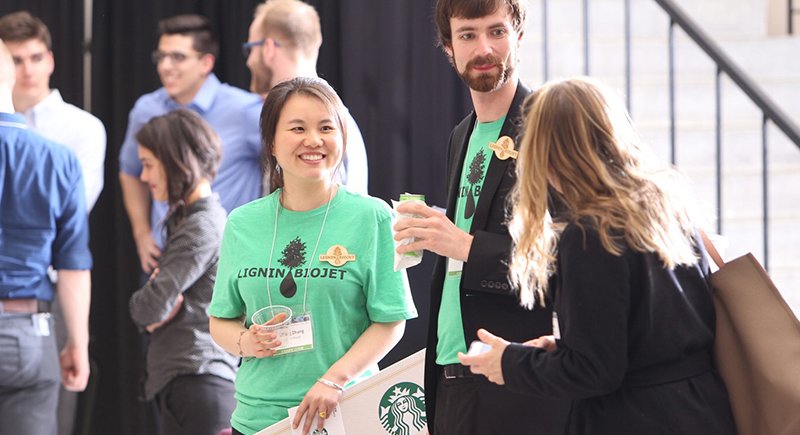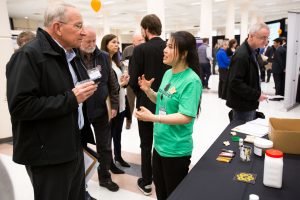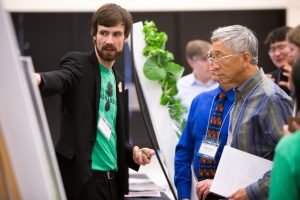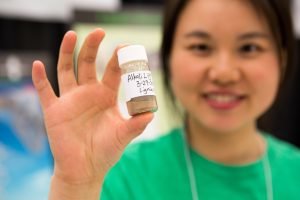
March 31, 2017 Team takes third at Alaska Airlines Environmental Innovation Challenge
By Maegan Murray, WSU Tri-Cities
RICHLAND, Wash. – A team from Washington State University Tri-Cities took third place among 21 teams at the Alaska Airlines Environmental Innovation Challenge’s finals this week for their creation and business model presentation of a technology that converts lignin, a natural byproduct of plant-based materials, into biojet fuel.

Photo courtesy: Matt Hagen / UW Buerk Center for Entrepreneurship
Libing Zhang talks with people at the Alaska Airlines Environmental Innovation Challenge.
During the challenge, interdisciplinary student teams define an environmental problem, develop a solution, design and build a prototype, create a business plan that proves their solution has market potential and pitches their idea to 170 judges from throughout the Northwest who have expertise in cleantech, as well as to entrepreneurs and inventors, at a demo-day event.
The WSU Tri-Cities team, composed of postdoctoral researcher Libing Zhang and Manuel Seubert, a master’s in business administration student, advanced to the finals from an initial pool of 29 teams during the first round of the competition.
Paul Skilton, WSU Tri-Cities associate professor of management, and Bin Yang, WSU Tri-Cities associate professor of biological systems engineering, advised the team. The WSU Tri-Cities team also worked regularly with researchers at the Pacific Northwest National Laboratory to prepare for the competition.
The team was presented with the Starbucks $5,000 prize for their third-place ranking in the final round of the competition.
Advancing biofuels
Zhang, team leader for the challenge, said the main benefits for their technology is that it takes lignin, a waste

Photo courtesy: Matt Hagen / UW Buerk Center for Entrepreneurship
Manuel Seubert presents at the Alaska Airlines Environmental Innovation Challenge.
product in the biorefineries and pulping process that is considered one of the most abundant renewable carbon sources on Earth, and turns it into an environmentally-friendly, cheap jet fuel that can potentially reduce the carbon emissions for commercial airlines.
“I see several advantages of the technology and hope we can scale it up for commercialization, which will help commercial airlines to achieve their goals in reducing greenhouse emissions,” she said.
Developing a commercial product
Seubert, team co-leader for the challenge, said their goal with the competition was to capture people’s attention for the value of their technology, while using the experience as a learning opportunity for their future in developing the lignin-based jet fuel product into a commercial business.
“The next challenge is to secure funding so that we can scale it up to an industrial scale,” he said. “We are

Photo courtesy: Matt Hagen / UW Buerk Center for Entrepreneurship
Libing Zhang displays a container of lignin
actively looking for funding sources at this point and are thinking about establishing a limited liability company, which will allow us to pursue small business grants.”
Zhang said raising awareness about the product was a crucial part of the competition experience.
“We want people to know that the technology for converting lignin to biojet fuel has a commercial value,” she said. “It is encouraging knowing that people care about the technology and see its potential for reducing the carbon footprint. Now, we hope to take the technology to the next level in the business world.”
Zhang is also the entrepreneurial lead on a National Science Foundation I-Corps lignin-to-biojetfuel project, which was awarded to Yang and his team.
Skilton said the project represents an excellence illustration of the cutting-edge, hands-on programming students experience at WSU Tri-Cities.
“This is an example of the kind of integrated project team work our MBA students come to WSU Tri-Cities to do,” he said.
The Alaska Airlines Environmental Innovation Challenge is the creation of the Buerk Center for Entrepreneurship in the Foster School of Business, in partnership with the University of Washington’s College of Engineering, College of the Environment, Clean Energy Institute, College of Built Environments and the Department of Biology.
Contacts:
Libing Zhang, WSU Tri-Cities recent doctoral graduate and postdoctoral researcher, libing.zhang@wsu.edu
Manuel Seubert, WSU Tri-Cities master’s in business administration student, manuel.seubert@wsu.edu
Maegan Murray, WSU Tri-Cities public relations specialist, 509-372-7333, maegan.murray@tricity.wsu.edu





